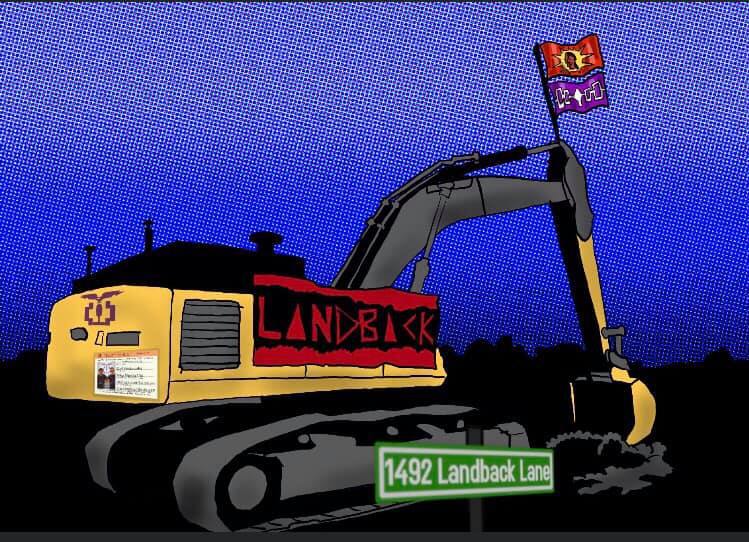Our content is fiercely open source and we never paywall our website. The support of our community makes this possible.
Make a donation of $35 or more and receive The Monitor magazine for one full year and a donation receipt for the full amount of your gift.
People everywhere should be watching what’s happening on Haudenosaunee (Six Nations) territory at 1492 Land Back Lane in Caledonia, Ontario.
The basic facts of this latest confrontation are plain enough.
In 2015 Foxgate Developments paid $4 million for 10 hectares of land bordering the town of Caledonia. The development company intends to build 218 homes there in a new subdivision, McKenzie Meadows. However, as University of Windsor associate dean of law Beverley Jacobs has explained, the land in question has been Six Nations territory since 1784: “We never gave up title to those lands and territories and in fact Canada owes us money for those lands and resources.”
The dispossession of Indigenous peoples from their lands is a defining feature of colonialism, as is the impoverishment that accompanies it. Without resources, no economic or cultural self-determination is possible. And no resource is more fundamental to a community’s existence than land.
This fact is recognized in the United Nations Declaration on the Rights of Indigenous Peoples (UNDRIP), which states unequivocally that “Indigenous peoples shall not be forcibly removed from their lands or territories.”
The fact that Canada has endorsed the UNDRIP principles—including, among other things, the right to self-determination—is both encouraging and embarrassing: encouraging because it shows that we know what must be done; embarrassing because we continue to fail to uphold them.
Despite declaring itself “a full supporter of the declaration, without qualification” in 2016, the government of Canada has failed to enact legislation to give the UNDRIP principles the force of law. This is unconscionable, especially given the time that has already passed and Prime Minister Justin Trudeau’s 2019 promise to enact such legislation before the end of 2020.
Such delays are, of course, familiar to Indigenous people, whose quest for justice has regularly resulted in negotiations and legal processes that drag on for decades. This is particularly galling in the era of COVID-19, which has shown how governments can act quickly and decisively—when they choose to.
At 1492 Land Back Lane, the premier of Ontario and the prime minister of Canada can both act quickly by working with all parties to find a solution that respects Haudenosaunee rights.
What is happening at 1492 Land Back Lane is, obviously, no isolated incident; it is merely a symptom of the Canadian settler state’s ongoing inability to fathom that Indigenous rights are real. This issue is playing out every day, from British Columbia, where Secwepemc and Wet’suwet’en land defenders have faced violent arrest, to the waters off Nova Scotia, where Mi’kmaq fishers face intimidation and outright violence for exercising their rights to earn a living fishing lobsters.
These and other conflicts like them will keep making the news—until Canada changes its ways. Moreover, they will make the critical work of reconciliation impossible to achieve.
For more information on Caledonia, please search for the 1492 Land Back Lane page on Facebook and be sure to read the October 28 statement by the Williams family here. For a comprehensive overview of Indigenous land rights in Canada over the last 50 years, read Land Back, the October 2019 paper from the Yellowhead Institute.
Randy Robinson is Ontario Director of the Canadian Centre for Policy Alternatives. Follow him on Twitter at @RandyFRobinson.
Erika Shaker is the Director of the CCPA National Office and Editor of Our Schools / Our Selves. She is on Twitter at @ErikaShaker.


